高中英语人教版必修三 Unit 1 Festivals around the world Period Three Grammar & Writing课件(38张)
文档属性
| 名称 | 高中英语人教版必修三 Unit 1 Festivals around the world Period Three Grammar & Writing课件(38张) |

|
|
| 格式 | zip | ||
| 文件大小 | 1.2MB | ||
| 资源类型 | 教案 | ||
| 版本资源 | 人教版(新课程标准) | ||
| 科目 | 英语 | ||
| 更新时间 | 2019-03-20 00:00:00 | ||
图片预览

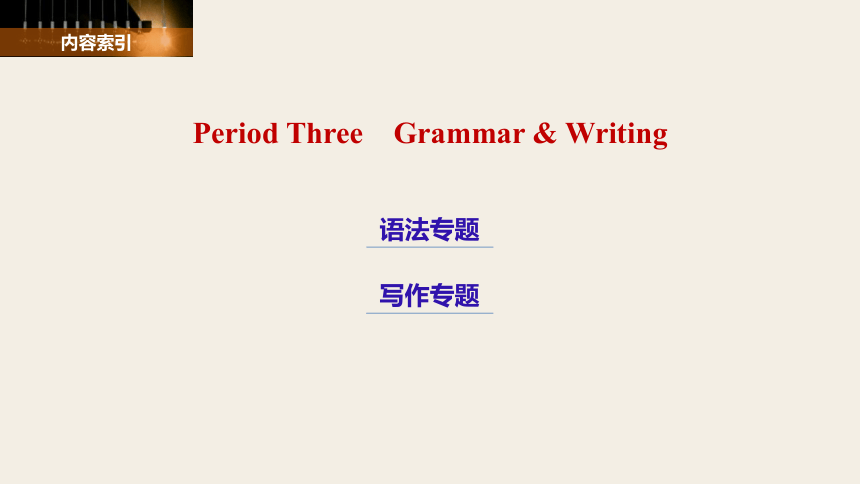


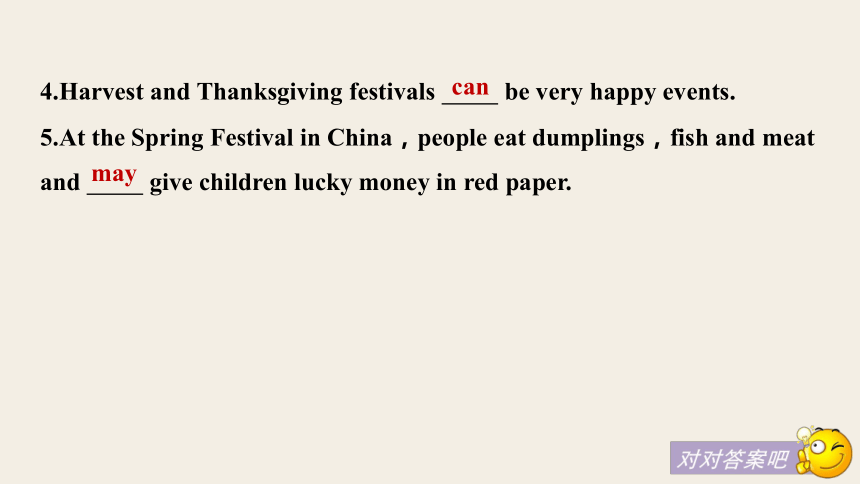
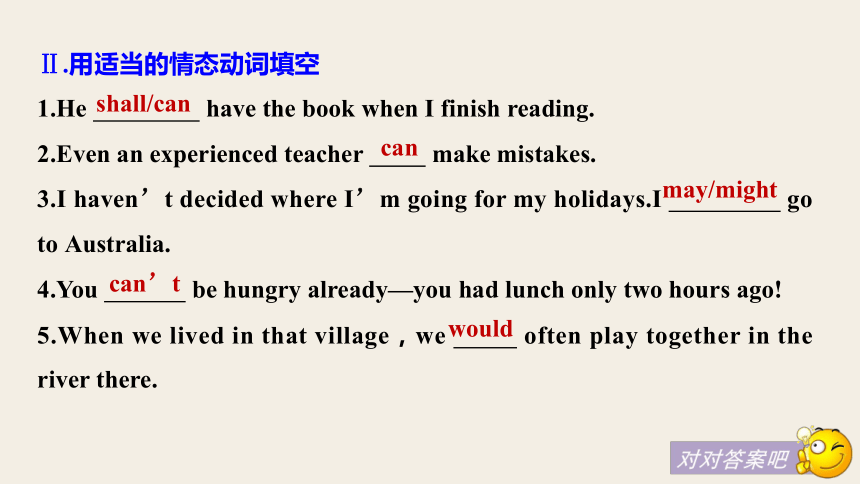


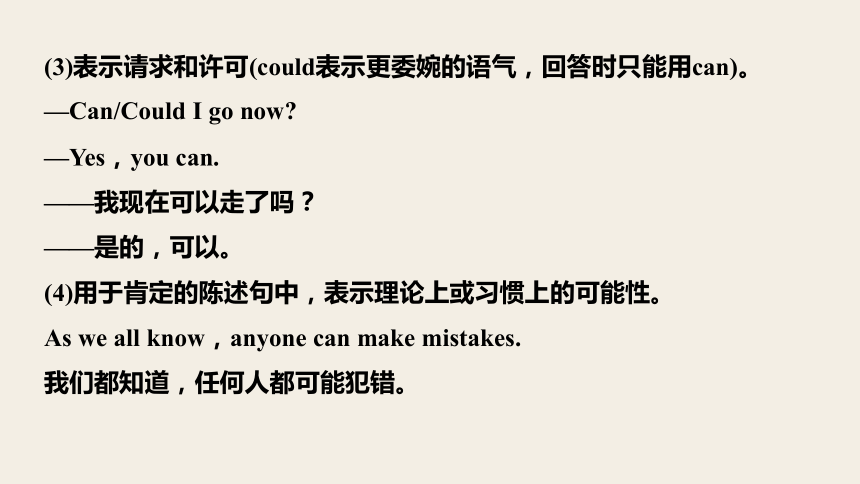

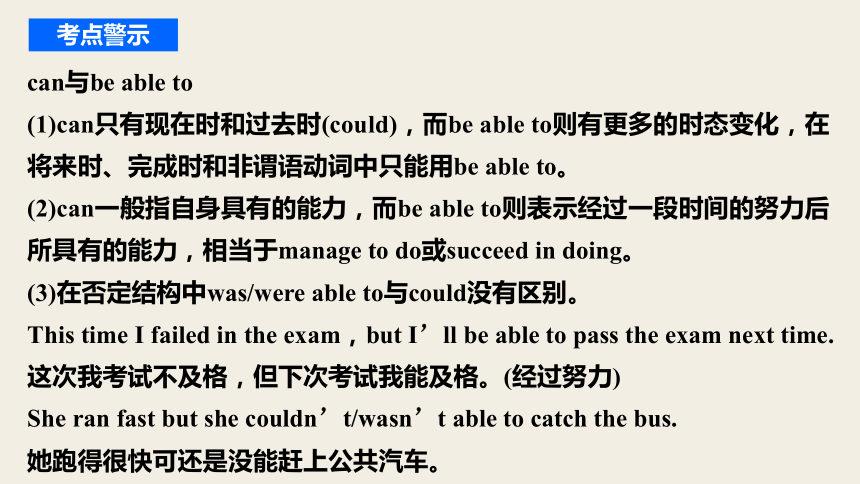
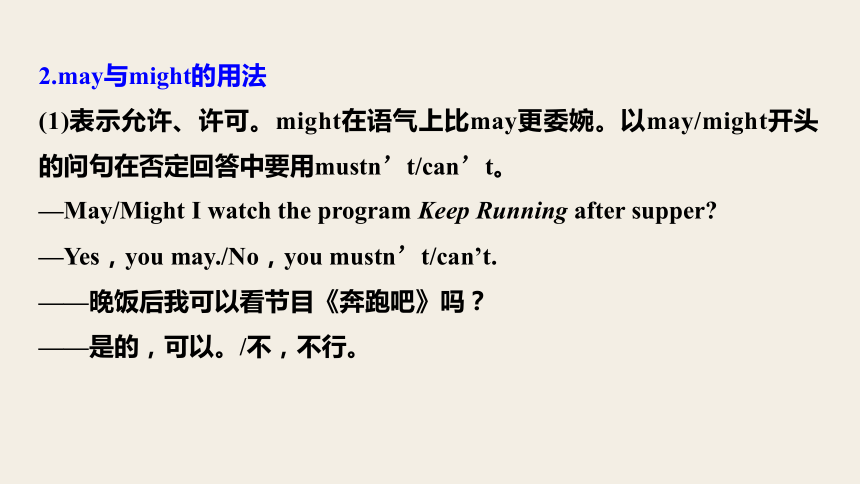
文档简介
课件38张PPT。Unit 1 Festivals around the world语法专题内容索引写作专题Period Three Grammar & Writing语法专题Ⅰ.用适当的情态动词完成课文原句
1.Most ancient festivals celebrate the end of cold weather,planting in spring and harvest in autumn.
2.Some festivals are held to honour the dead or to satisfy the ancestors,who return either to help or to do harm.
3.For the Japanese festival Obon,people go to clean graves and light incense in memory of their ancestors.情态动词 (Ⅰ)wouldmightshould4.Harvest and Thanksgiving festivals be very happy events.
5.At the Spring Festival in China,people eat dumplings,fish and meat and give children lucky money in red paper.canmayⅡ.用适当的情态动词填空
1.He have the book when I finish reading.
2.Even an experienced teacher make mistakes.
3.I haven’t decided where I’m going for my holidays.I go to Australia.
4.You be hungry already—you had lunch only two hours ago!
5.When we lived in that village,we often play together in the river there.shall/cancanmay/mightcan’twould6.“You have a wrong number,” she said.“There’s no one of that name here.”
7.Drivers drive after drinking.
8.She promised to come by 12:00.She be here at any time.mustmustn’t should1.can与could的用法
(1)表示能力(could是过去时)。
My grandmother can do some shopping on the Internet,but she couldn’t last year.
我奶奶会网购了,但是去年她还不会。
(2)表示猜测意为“可能”,一般用于疑问句和否定句(could是过去时)。
Can this news be true?这则消息是真的吗?(3)表示请求和许可(could表示更委婉的语气,回答时只能用can)。
—Can/Could I go now?
—Yes,you can.
——我现在可以走了吗?
——是的,可以。
(4)用于肯定的陈述句中,表示理论上或习惯上的可能性。
As we all know,anyone can make mistakes.
我们都知道,任何人都可能犯错。(5)习惯用法“cannot...too...”表示“无论怎样……都不过分,越……越好”。有时cannot可用can never替代。
We cannot thank you too much for what you’ve done for us.对于你们为我们所做的一切,我们怎么感激你们都不过分。can与be able to
(1)can只有现在时和过去时(could),而be able to则有更多的时态变化,在将来时、完成时和非谓语动词中只能用be able to。
(2)can一般指自身具有的能力,而be able to则表示经过一段时间的努力后所具有的能力,相当于manage to do或succeed in doing。
(3)在否定结构中was/were able to与could没有区别。
This time I failed in the exam,but I’ll be able to pass the exam next time.
这次我考试不及格,但下次考试我能及格。(经过努力)
She ran fast but she couldn’t/wasn’t able to catch the bus.
她跑得很快可还是没能赶上公共汽车。考点警示2.may与might的用法
(1)表示允许、许可。might在语气上比may更委婉。以may/might开头的问句在否定回答中要用mustn’t/can’t。
—May/Might I watch the program Keep Running after supper?
—Yes,you may./No,you mustn’t/can’t.
——晚饭后我可以看节目《奔跑吧》吗?
——是的,可以。/不,不行。(2)表示把握不大的推测,意为“可能”,用于肯定句。
might语气更加不肯定,指现在或将来,只有在宾语从句中might do (be)才表示过去的可能性。
I think he may come tomorrow.
我认为明天他可能会来。
(3)may用于祈使句表示祝愿。
May you succeed.祝你成功。3.will与would的用法
(1)表示意志、意愿和决心。用于各种人称,will指现在,would指过去。
I will never do that again.我再也不那样做了。
They said that they would fight against the haze.
他们说会与雾霾作斗争的。
(2)表示请求、建议。用于第二人称的疑问句,would表示更委婉的语气。
Will/Would you please take a message for me?
你能帮我捎个口信吗?
(3)表示习惯性的动作,意为“总是;习惯于”。will指现在,would指过去。
Fish will die without water.没有水鱼儿就会死。would与used to
两者均表示“过去常常”,但would仅表示过去的习惯性动作(不表状态),现在有可能还如此,也可能不再那样;used to既表示过去的动作也表示过去的状态,不过现在不再做或不再有那种状态了。
He would take a walk near the forest in the evening.
以前,他晚间常在森林附近散步。
He used to take a walk near the forest in the evening.
他过去常在晚间到森林附近散步。(而现在已不在那里散步了)考点警示(4)用于否定句,表示“不肯;不乐意”。
No matter what I said,he wouldn’t listen to me.
无论我说什么,他就是不肯听我的。4.shall与should的用法
(1)shall用于第一、第三人称的疑问句中,表示说话人征求对方的意见或向对方请示。
What shall I/we do next?
我(们)下一步该做什么?
When shall my brother be able to leave hospital?
我哥哥什么时候可以出院?(2)shall用于第二、第三人称,表示说话人给对方命令、警告、允诺或威胁。
You shall go with me.(命令)你跟我走。
You shall have a new dress for your birthday.(允诺)
你在生日时会得到一件新衣服。
He shall be punished.(威胁)他会受到惩罚的。(3)should表示劝告或建议,意为“应该”,其同义词是ought to;还可表示可能性或表示惊讶、愤怒、失望等特殊情感。
You should go to class right away.
你应该立刻去上课。
Don’t ask me.How should I know?
别问我,我怎么会知道?5.must的用法
(1)表示“必须”,语气比should,ought to强烈。其否定形式为mustn’t (不准;禁止)。
You mustn’t do that,because you must keep your word.
你不能那么做,因为你得遵守诺言。以must开头的一般疑问句的肯定回答中要用must,否定回答中要用needn’t/don’t have to。
—Must I finish the paper today?
—Yes,you must./No,you needn’t/don’t have to.
——今天我必须完成论文吗?
——是的,你必须。/不,你不必。考点警示(2)表示有把握的肯定推测,只能用在肯定句中,意为“一定;准是”;在否定句、疑问句中要用can’t代替。
You have worked hard all day.You must be tired.
辛苦工作了一整天,你一定累了。(对现在情况的推测判断)
(3)表示感彩,意为“偏偏;偏要”,常指令人不快的事情。
The car must break down just when I was about to start.
我正要出发时车偏偏抛锚了。(4) Each time his mother’s birthday came,he buy her a present.
(5) He be late for school,but now he is used to getting up early.选词填空
(1) He looks so pale.He be ill.
(2) They be having a meeting,but I’m not sure.
(3) I wonder whether this story be true.mustmaycanwouldused tomay,must,canwould,used to题组训练(8) Tom,you play with the dog;it may hurt you.
(9)—Is Jack on duty today?
—It be him.It’s his turn tomorrow.
(10) The boy is so shy that he express himself well.(6) Jim is waiting outside. he come in?
(7) You go to the doctor at once.Shallshouldmustn’tcan’tcan’t shall,shouldmustn’t,can’t用适当的情态动词填空
1.Samuel,the tallest boy in our class, easily reach the books on the top shelf.(2017·北京)
2.I love the weekend,because I get up early on Saturdays and Sundays.(2016·北京)
3.Some classmates suggest we go to places of interest nearby.
(2016·全国Ⅱ)
4.You be careful with the camera.It costs! (2015·四川)canneedn’t shouldmust5.You feel all the training a waste of time,but I’m a hundred percent sure later you’ll be grateful you did it.(2015·陕西)
6.It was so noisy that we hear ourselves speak.(2015·浙江)
7.It was sad to me that they,so poor themselves, bring me food.
(2014·江苏)
8.I still remember my happy childhood when my mother take me to Disneyland at weekends.(2014·四川)
9.When I was a child,I watch TV whenever I wanted to.(2013·江西)maycouldn’tshouldwouldcould写作专题1.明确写英语故事的基本要素
英语故事属于记叙文,进行此类写作时,一般需要把握好记叙文的六个要素,即时间(when)、地点(where)、事件(what)、人物(who)、原因(why)和方式(how)。尽管不是每篇英语记叙文都一定要将这些要素全部包括进去,但是,确定写作内容、收集写作素材必定要围绕这些要素进行。Narrative:a story2.确定写作的人称和故事展开的顺序
写故事时要注意人称,用第一人称主要是以“参与者”的身份介绍本人的经历或耳闻目睹之事;用第三人称则主要是以“观察者”的身份介绍他人的经历和事情。不过在用第一人称时,不要过多地使用I,we,以免给人单调乏味的感觉;在以第三人称进行叙述时,要避免过多的评论,以致失去故事的客观性。
在确定了叙述的角度后,还要确定以何种顺序展开记叙。讲述故事时最常见的方式是以时间为线索交代故事的发生、发展和结局。这样,文章层次清晰,脉络分明,有较强的整体感。3.正确把握时态,提高语言的准确性
英语故事往往介绍过去发生的事,所以通常使用过去时态。故事结束后描写从中吸取的教训或故事发展的后续时常用一般现在时或将来时。
4.选择使用情感性词汇,提升文章的感染力
英语故事写作中可使用一些情感性词汇来提升文章的感染力,此类词汇有:even,still,only,hardly,almost,indeed,certainly,to one’s joy/surprise/disappointment,fortunately等。1.One day,on the way to...
2.Last Sunday,my mother and I were doing...when we saw/heard...
3.Long long ago/Once upon a time,there was/were...
4.About...o’clock one evening in...,my...was doing...
5.Without delay/hesitation,I/we dialed 120/119/122.It wasn’t long before an ambulance/...arrived.
6.We tried our best to help...,but...
7.We make every effort to help...After a while,many people came to help us.At last,...was saved/we succeeded.
8.Although we were very tired,we felt very happy.假设你是红星中学高一(1)班的学生李华,校报英文版正在开展“续写雷锋日记”活动。请根据以下四幅图的先后顺序,将你所做的一件好事以日记的形式记述下来,向校报投稿。
注意:1.词数80左右;
2.日记的开头已为你写好,
不计入总词数。Step One 审题谋篇
写作要求是写一篇日记,记叙自己帮助别人的故事。写作时应注意下面几点:
1.确定文体:这是一篇日记。写作时注意日记的写作特点。
2.主体时态:文章应以一般过去时为主。
3.主体人称:由于是叙述过去自己对别人的帮助,所以人称应该以第一人称和第三人称为主。写作步骤Step Two 联想词汇
1.沿着街道走
2.看上去很迷茫
3.迷路
4.寻找
5.带领某人去……
6.建议某人做某事
7.不久以后
8.和……挥手告别walk along the streetlook puzzledget/be lostlook forlead sb.to...advise sb.to do sth.before longwave goodbye to...Step Three 句式升级
1.今天早上,我沿着街道走着时看到两位旅客在看地图,他们看上去很迷茫。
This morning,when I was walking along the street,I saw that two travelers were reading a map .(and连接的并列句)
This morning,when I was walking along the street,I saw that two travelers were reading a map, .(现在分词短语作状语)and they looked puzzledlooking puzzled2.他们看起来好像是迷路了。
(简单句)
(复合句)
3.我带他们到附近的公交车站并建议他们坐20路公交车,这班车直达目的地。
I led them to the nearby bus stop and advised them to take Bus No.20 and .(and连接并列句)
I led them to the nearby bus stop and advised them to take Bus No.20, .(which引导定语从句)They seemed to have got lost.It seemed that they were lost.it could take them there directlywhich could take them there directlyStep Four 连句成篇 Saturday,June 3,2017FineThis morning, ______________________________________________
__________________________________________________________________________________________________________________________________________________________________________________________________________________________________________________________________________________________________________________________________________________________________________________________ when I was walking along the street,I saw that two travelers were reading a map,looking puzzled.It seemed that they were lost.I went up to them and asked how I could help.They told me they were looking for the Temple of Heaven.I led them to the nearby bus stop and advised them to take Bus No.20,which could take them there directly.They appreciated my help greatly.Before long,the bus came.We waved goodbye to each other.Seeing them on the bus,I felt very satisfied.本课结束
1.Most ancient festivals celebrate the end of cold weather,planting in spring and harvest in autumn.
2.Some festivals are held to honour the dead or to satisfy the ancestors,who return either to help or to do harm.
3.For the Japanese festival Obon,people go to clean graves and light incense in memory of their ancestors.情态动词 (Ⅰ)wouldmightshould4.Harvest and Thanksgiving festivals be very happy events.
5.At the Spring Festival in China,people eat dumplings,fish and meat and give children lucky money in red paper.canmayⅡ.用适当的情态动词填空
1.He have the book when I finish reading.
2.Even an experienced teacher make mistakes.
3.I haven’t decided where I’m going for my holidays.I go to Australia.
4.You be hungry already—you had lunch only two hours ago!
5.When we lived in that village,we often play together in the river there.shall/cancanmay/mightcan’twould6.“You have a wrong number,” she said.“There’s no one of that name here.”
7.Drivers drive after drinking.
8.She promised to come by 12:00.She be here at any time.mustmustn’t should1.can与could的用法
(1)表示能力(could是过去时)。
My grandmother can do some shopping on the Internet,but she couldn’t last year.
我奶奶会网购了,但是去年她还不会。
(2)表示猜测意为“可能”,一般用于疑问句和否定句(could是过去时)。
Can this news be true?这则消息是真的吗?(3)表示请求和许可(could表示更委婉的语气,回答时只能用can)。
—Can/Could I go now?
—Yes,you can.
——我现在可以走了吗?
——是的,可以。
(4)用于肯定的陈述句中,表示理论上或习惯上的可能性。
As we all know,anyone can make mistakes.
我们都知道,任何人都可能犯错。(5)习惯用法“cannot...too...”表示“无论怎样……都不过分,越……越好”。有时cannot可用can never替代。
We cannot thank you too much for what you’ve done for us.对于你们为我们所做的一切,我们怎么感激你们都不过分。can与be able to
(1)can只有现在时和过去时(could),而be able to则有更多的时态变化,在将来时、完成时和非谓语动词中只能用be able to。
(2)can一般指自身具有的能力,而be able to则表示经过一段时间的努力后所具有的能力,相当于manage to do或succeed in doing。
(3)在否定结构中was/were able to与could没有区别。
This time I failed in the exam,but I’ll be able to pass the exam next time.
这次我考试不及格,但下次考试我能及格。(经过努力)
She ran fast but she couldn’t/wasn’t able to catch the bus.
她跑得很快可还是没能赶上公共汽车。考点警示2.may与might的用法
(1)表示允许、许可。might在语气上比may更委婉。以may/might开头的问句在否定回答中要用mustn’t/can’t。
—May/Might I watch the program Keep Running after supper?
—Yes,you may./No,you mustn’t/can’t.
——晚饭后我可以看节目《奔跑吧》吗?
——是的,可以。/不,不行。(2)表示把握不大的推测,意为“可能”,用于肯定句。
might语气更加不肯定,指现在或将来,只有在宾语从句中might do (be)才表示过去的可能性。
I think he may come tomorrow.
我认为明天他可能会来。
(3)may用于祈使句表示祝愿。
May you succeed.祝你成功。3.will与would的用法
(1)表示意志、意愿和决心。用于各种人称,will指现在,would指过去。
I will never do that again.我再也不那样做了。
They said that they would fight against the haze.
他们说会与雾霾作斗争的。
(2)表示请求、建议。用于第二人称的疑问句,would表示更委婉的语气。
Will/Would you please take a message for me?
你能帮我捎个口信吗?
(3)表示习惯性的动作,意为“总是;习惯于”。will指现在,would指过去。
Fish will die without water.没有水鱼儿就会死。would与used to
两者均表示“过去常常”,但would仅表示过去的习惯性动作(不表状态),现在有可能还如此,也可能不再那样;used to既表示过去的动作也表示过去的状态,不过现在不再做或不再有那种状态了。
He would take a walk near the forest in the evening.
以前,他晚间常在森林附近散步。
He used to take a walk near the forest in the evening.
他过去常在晚间到森林附近散步。(而现在已不在那里散步了)考点警示(4)用于否定句,表示“不肯;不乐意”。
No matter what I said,he wouldn’t listen to me.
无论我说什么,他就是不肯听我的。4.shall与should的用法
(1)shall用于第一、第三人称的疑问句中,表示说话人征求对方的意见或向对方请示。
What shall I/we do next?
我(们)下一步该做什么?
When shall my brother be able to leave hospital?
我哥哥什么时候可以出院?(2)shall用于第二、第三人称,表示说话人给对方命令、警告、允诺或威胁。
You shall go with me.(命令)你跟我走。
You shall have a new dress for your birthday.(允诺)
你在生日时会得到一件新衣服。
He shall be punished.(威胁)他会受到惩罚的。(3)should表示劝告或建议,意为“应该”,其同义词是ought to;还可表示可能性或表示惊讶、愤怒、失望等特殊情感。
You should go to class right away.
你应该立刻去上课。
Don’t ask me.How should I know?
别问我,我怎么会知道?5.must的用法
(1)表示“必须”,语气比should,ought to强烈。其否定形式为mustn’t (不准;禁止)。
You mustn’t do that,because you must keep your word.
你不能那么做,因为你得遵守诺言。以must开头的一般疑问句的肯定回答中要用must,否定回答中要用needn’t/don’t have to。
—Must I finish the paper today?
—Yes,you must./No,you needn’t/don’t have to.
——今天我必须完成论文吗?
——是的,你必须。/不,你不必。考点警示(2)表示有把握的肯定推测,只能用在肯定句中,意为“一定;准是”;在否定句、疑问句中要用can’t代替。
You have worked hard all day.You must be tired.
辛苦工作了一整天,你一定累了。(对现在情况的推测判断)
(3)表示感彩,意为“偏偏;偏要”,常指令人不快的事情。
The car must break down just when I was about to start.
我正要出发时车偏偏抛锚了。(4) Each time his mother’s birthday came,he buy her a present.
(5) He be late for school,but now he is used to getting up early.选词填空
(1) He looks so pale.He be ill.
(2) They be having a meeting,but I’m not sure.
(3) I wonder whether this story be true.mustmaycanwouldused tomay,must,canwould,used to题组训练(8) Tom,you play with the dog;it may hurt you.
(9)—Is Jack on duty today?
—It be him.It’s his turn tomorrow.
(10) The boy is so shy that he express himself well.(6) Jim is waiting outside. he come in?
(7) You go to the doctor at once.Shallshouldmustn’tcan’tcan’t shall,shouldmustn’t,can’t用适当的情态动词填空
1.Samuel,the tallest boy in our class, easily reach the books on the top shelf.(2017·北京)
2.I love the weekend,because I get up early on Saturdays and Sundays.(2016·北京)
3.Some classmates suggest we go to places of interest nearby.
(2016·全国Ⅱ)
4.You be careful with the camera.It costs! (2015·四川)canneedn’t shouldmust5.You feel all the training a waste of time,but I’m a hundred percent sure later you’ll be grateful you did it.(2015·陕西)
6.It was so noisy that we hear ourselves speak.(2015·浙江)
7.It was sad to me that they,so poor themselves, bring me food.
(2014·江苏)
8.I still remember my happy childhood when my mother take me to Disneyland at weekends.(2014·四川)
9.When I was a child,I watch TV whenever I wanted to.(2013·江西)maycouldn’tshouldwouldcould写作专题1.明确写英语故事的基本要素
英语故事属于记叙文,进行此类写作时,一般需要把握好记叙文的六个要素,即时间(when)、地点(where)、事件(what)、人物(who)、原因(why)和方式(how)。尽管不是每篇英语记叙文都一定要将这些要素全部包括进去,但是,确定写作内容、收集写作素材必定要围绕这些要素进行。Narrative:a story2.确定写作的人称和故事展开的顺序
写故事时要注意人称,用第一人称主要是以“参与者”的身份介绍本人的经历或耳闻目睹之事;用第三人称则主要是以“观察者”的身份介绍他人的经历和事情。不过在用第一人称时,不要过多地使用I,we,以免给人单调乏味的感觉;在以第三人称进行叙述时,要避免过多的评论,以致失去故事的客观性。
在确定了叙述的角度后,还要确定以何种顺序展开记叙。讲述故事时最常见的方式是以时间为线索交代故事的发生、发展和结局。这样,文章层次清晰,脉络分明,有较强的整体感。3.正确把握时态,提高语言的准确性
英语故事往往介绍过去发生的事,所以通常使用过去时态。故事结束后描写从中吸取的教训或故事发展的后续时常用一般现在时或将来时。
4.选择使用情感性词汇,提升文章的感染力
英语故事写作中可使用一些情感性词汇来提升文章的感染力,此类词汇有:even,still,only,hardly,almost,indeed,certainly,to one’s joy/surprise/disappointment,fortunately等。1.One day,on the way to...
2.Last Sunday,my mother and I were doing...when we saw/heard...
3.Long long ago/Once upon a time,there was/were...
4.About...o’clock one evening in...,my...was doing...
5.Without delay/hesitation,I/we dialed 120/119/122.It wasn’t long before an ambulance/...arrived.
6.We tried our best to help...,but...
7.We make every effort to help...After a while,many people came to help us.At last,...was saved/we succeeded.
8.Although we were very tired,we felt very happy.假设你是红星中学高一(1)班的学生李华,校报英文版正在开展“续写雷锋日记”活动。请根据以下四幅图的先后顺序,将你所做的一件好事以日记的形式记述下来,向校报投稿。
注意:1.词数80左右;
2.日记的开头已为你写好,
不计入总词数。Step One 审题谋篇
写作要求是写一篇日记,记叙自己帮助别人的故事。写作时应注意下面几点:
1.确定文体:这是一篇日记。写作时注意日记的写作特点。
2.主体时态:文章应以一般过去时为主。
3.主体人称:由于是叙述过去自己对别人的帮助,所以人称应该以第一人称和第三人称为主。写作步骤Step Two 联想词汇
1.沿着街道走
2.看上去很迷茫
3.迷路
4.寻找
5.带领某人去……
6.建议某人做某事
7.不久以后
8.和……挥手告别walk along the streetlook puzzledget/be lostlook forlead sb.to...advise sb.to do sth.before longwave goodbye to...Step Three 句式升级
1.今天早上,我沿着街道走着时看到两位旅客在看地图,他们看上去很迷茫。
This morning,when I was walking along the street,I saw that two travelers were reading a map .(and连接的并列句)
This morning,when I was walking along the street,I saw that two travelers were reading a map, .(现在分词短语作状语)and they looked puzzledlooking puzzled2.他们看起来好像是迷路了。
(简单句)
(复合句)
3.我带他们到附近的公交车站并建议他们坐20路公交车,这班车直达目的地。
I led them to the nearby bus stop and advised them to take Bus No.20 and .(and连接并列句)
I led them to the nearby bus stop and advised them to take Bus No.20, .(which引导定语从句)They seemed to have got lost.It seemed that they were lost.it could take them there directlywhich could take them there directlyStep Four 连句成篇 Saturday,June 3,2017FineThis morning, ______________________________________________
__________________________________________________________________________________________________________________________________________________________________________________________________________________________________________________________________________________________________________________________________________________________________________________________ when I was walking along the street,I saw that two travelers were reading a map,looking puzzled.It seemed that they were lost.I went up to them and asked how I could help.They told me they were looking for the Temple of Heaven.I led them to the nearby bus stop and advised them to take Bus No.20,which could take them there directly.They appreciated my help greatly.Before long,the bus came.We waved goodbye to each other.Seeing them on the bus,I felt very satisfied.本课结束
同课章节目录
